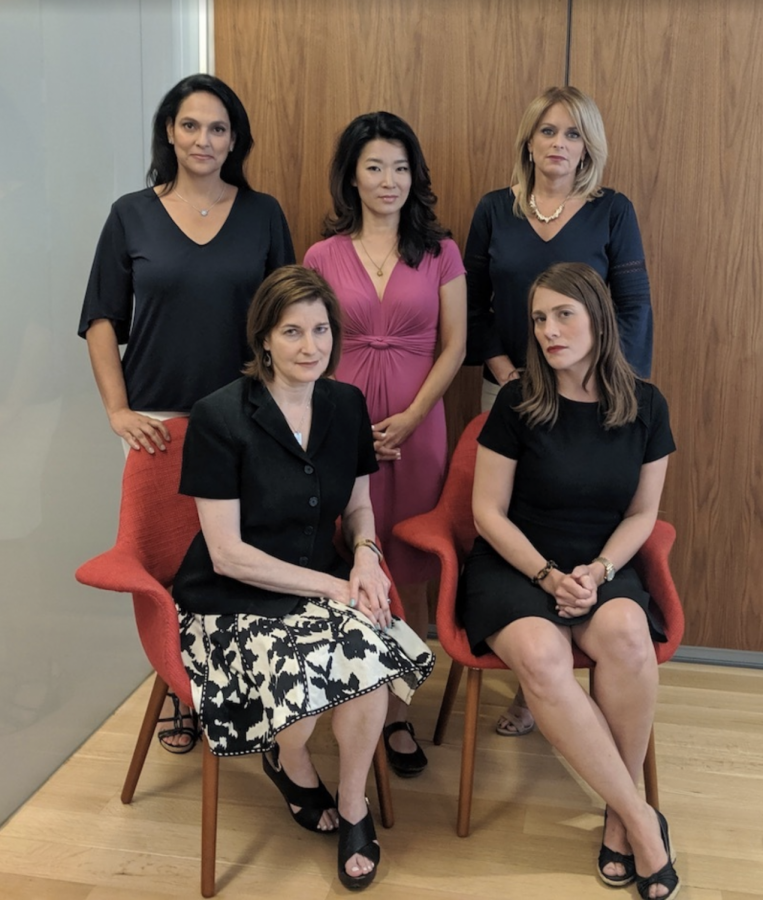Fordham Alumni Take Up Anti-Discrimination Case Against NY1
COURTESY OF JEANINE RAMIREZ
The plaintiffs of the case. From left to right (standing): Jeanine Ramirez, Vivian Lee and Kristen Shaughnessy. (Seated:) Roma Torre and Amanda Farinacci.
August 25, 2019
On June 19, 2019, five anchorwomen — including two Fordham University alumni — filed a discrimination lawsuit against their employer, Charter Communications, which took over New York’s local Spectrum News channel, NY1, in 2016.
The suit was originally filed in Federal District Court by reporters Amanda Farinacci, Fordham College at Rose Hill (FCRH) ’01, Vivian Lee; Jeanine Ramirez, FCRH ’92; Kristen Shaughnessy and Roma Torre, on the grounds of age and gender discrimination.
The plaintiffs assert that, in spite of ample experience, they have been “treated like second-class citizens for years,” according to an open letter released the same day as the suit. They report being excluded, unrecognized, pushed aside or denied air time in favor of men and younger women, particularly since Charter bought the network.
“Separately we all started to feel like we were being marginalized,” said Ramirez, a Brooklyn native and Fordham graduate who has been at NY1 since 1996. “When we began to talk to each other, we realized this was systemic.”
“Why should a woman who has worked hard to build her career suddenly find she’s losing value as she ages?” asked Ramirez. “Why do all of those years of experience only count for men who are revered for their depth of knowledge and credibility as they get older?”
In contrast, older male reporters at NY1 typically receive awards and honors for their commitment to the network, such as when “Mornings on 1” host Pat Keirnan celebrated his 20th anniversary at NY1 amid much fanfare in 2017. Women with more experience have allegedly been denied the same recognition as well as financial compensation.
Upon voicing these concerns, however, the anchors claim to have been ignored: “individually, we took our concerns to management, which labeled us complainers, and we documented what was happening,” said Ramirez.
“This is hardly a new phenomenon in the news media, and we are not alone,” the plaintiffs wrote. “It has been widely reported that older female television journalists often face never-ending hurdles towards advancement and frequently face uphill battles just to maintain the status quo.”
Ramirez explained that the choice to file a suit publicly was intended to highlight the larger issue in the field. “The choices for us were to do nothing and allow ourselves to be pushed out, quit and find another job or file a lawsuit and fight not only for ourselves but for all of those who have been forced out of their positions because they got old.”
On July 31, former NY1 employees Michelle Greenstein and Thalia Perez followed their example and filed a second lawsuit, claiming that they were fired from NY1 after starting families of their own. Perez, who was fired while pregnant, and Greenstein, who was fired shortly after becoming a mother both say they were replaced by younger reporters. Charter claims that the decision to fire them was part of an effort to hire more full-time employees and that neither reporter applied for an open position.
Since the initial filing, “the work environment can be awkward at times” for the plaintiffs, according to Ramirez.
“Of course not everyone supports us but we’ve been very clear that we bear no animosity toward any of our colleagues,” said Torre.
In July, Torre was denied the chance to cover the U.S. women’s soccer team’s victory parade, which she believes was retaliation by the management for signing her name to the lawsuit. Torre, who has been working at NY1 since 1992, responded with a second open letter on July 9, calling her exclusion “a further demonstration of NY1’s complete failure to take women’s issues seriously.”
“By excluding me from the live coverage and going against their own best interests, I had to conclude that the problem is systemic within Charter and needed to be called out,” Torre said in reference to her open letter. “They were in effect demonstrating the very same discriminatory practices the World Cup women were fighting against.”
Torre’s second open letter is addressed to Mayor de Blasio and concludes with a call for him to “condemn NY1’s actions in the strongest terms and continue to stand with us as we make change.” The mayor tweeted his thoughts in response: “@RomaTorreNYC is a tireless advocate who’s worked hard to earn the trust of New Yorkers — she belongs at this parade.”
However, Torre drew a few lessons from the situation. “Corporations, as we all know, can be ruthless, and their deep pockets ensure a protracted fight,” she said. “My only and best advice [for individuals facing similar workplace conditions] is to document everything and keep detailed notes. Research workplace policy pertaining to discrimination, and share concerns with colleagues who may be experiencing similar mistreatment.”
Despite tensions at the studio, Ramirez went on to say that “what’s been amazing though is all of the support we’ve received from co-workers who see what’s been going on” and that “viewers who have watched us and relied on our reporting for years.”
“Though we were all very committed to following through with the lawsuit, we were dreading the fallout once the news broke … I believe I was the first to walk into the newsroom when the NY Times article hit and it was rather surreal,” said Torre. “Instead of being shunned, I was embraced, literally, by many of my colleagues.”
Both Torre and Ramirez also addressed the wider implications of the lawsuit.
“We’re hoping our action shines a light on the discriminatory practices in the TV news industry that have been going on unchallenged for decades,” Ramirez said of herself and her colleagues.
“We obviously struck a nerve with this case,” Torre said, “and if it means we’ve helped other women combat their own unfair treatment, then no matter the outcome, we’ve won at least that round.”











